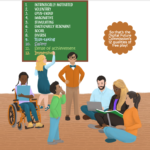
Photo by Jose Moreno
In her book Reclaiming Conversation, Sherry Turkle writes about the work of conversation. Think about it. We show up to talk with other people face-to-face (when we could be watching the next episode of You Name It or tunneling miles down in Instagram). We listen without judgments (or at least we try hard to suspend our usual lightning-fast judgments). We ask questions when we don’t understand and we make ourselves vulnerable. We risk sharing what we’re thinking, especially when our thoughts are still unformed and our feelings may be raw, confusing, or overwhelming. We struggle to articulate a question that plagues us. We discover what we’re passionate about or what’s worrying us as we hear ourselves thinking aloud. We sense what we’re too afraid to share. We become more skillful at offering our attention to another. We hear solutions that would never have occurred to us on our own. We discover the value of thinking with others as we arrive at a place we could only arrive at together. We learn to navigate disagreement and conflict with increasing grace and appreciation for another’s point of view. We grow more tolerant of the natural lulls and pauses in conversation, letting the silences be ok. Turkle writes:
In work, love, and friendship, relationships of mutuality depend on listening to what might be boring to you but is of interest to someone else. In conversation, a ‘lull’ may be on its way to becoming something else. If a moment in a conversation is slow, there is no way to know when things will pick up except to stay with the conversation. People take time to think and then they think of something new.
What better place to to engage in Conversation as Practice than a weekly conversation with our family members about our lives with technology? With our laptops and phones as direct portals to everything awesome and distressing in the world, a weekly conversation about our lives with technology today is a conversation about life.
This past week our devices brought us tweets, photos, and video footage taken by Marjory Stoneman Douglas High School students during the school shooting in Parkland, Florida on February 14. Common Sense Media writer Carolyn Knorr writes in a February 20th post, How to talk to kids about difficult subjects:
One of the toughest jobs of parenting is talking to your kids about difficult subjects…But in the age of cell phone notifications, streaming video, and 24-hour news coverage—when even little kids are exposed to really serious stories—it’s important to face this challenge head-on. Addressing the tough stuff makes your kids feel safer, strengthens your bond, and teaches them about the world. And when you show them how to gather and interpret information, ask questions, and cross-check sources, they become critical thinkers. It’s always sad to confront the issues the world hasn’t been able to solve. But by investing our kids with knowledge, compassion, and strong character, we can give them all the tools they need to make things better.
Showing up for the weekly work of face-to-face conversation about our relationship with technology is going to help us when we have to talk about the most difficult topics. We’ll have built the trust and confidence that we can talk about hard things together. If we’re not doing a weekly technology conversation already, now is the perfect time to begin.
I’m not suggesting that we turn away from our devices. To the contrary, I’m suggesting that we look more closely at them to begin a more self-aware relationship with them.
—Sherry Turkle


